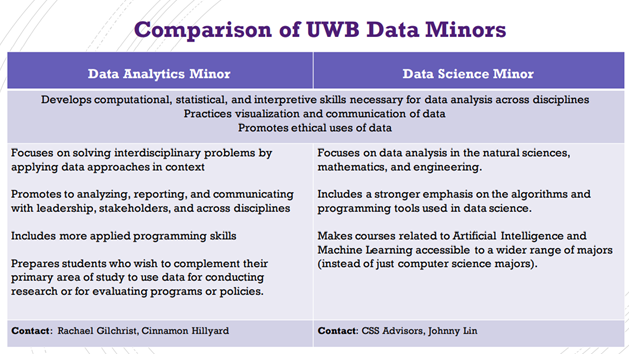Data Analytics Minor
The Data Analytics Minor, approved for AUT 2023, is interdisciplinary and will allow students to develop computational, statistical and interpretive skills necessary to apply data analysis to problems in their home discipline, while also carefully considering critiques of and the social context for such methods.
Admission Requirements
Prerequisite Courses: Prior to declaring the Minor, students must complete a course or course option in the following categories:
- Introductory statistics course: BBUS 215, BIS 215, BMATH 215, STMATH 341, STMATH 390, STMATH 392, or equivalent.
Completion Requirements
The Data Analytics Minor requires a total of 5 courses (25 credits); 3 required courses (15 credits) and 2 electives (10 credits).
Required courses (15 credits):
| Credits | Course Number | Course Title | Prerequisites |
| 5 | B DATA 200 | Introduction to Data Studies | None |
| 5 | BIS 232 | Introduction to Data Visualization | None |
| 5 | B BUS 301 | Data Management | BIS 215 (Understanding Statistics),B BUS 215 (Intro to Business Statistics), B MATH 215 (Statistics for Health Sciences), STMATH 341 (Intro to Statistical Inference), or equivalent. |
No more than 10 credits a student counts towards the Minor may count towards the student’s major. Students must earn a minimum of a 2.0 grade in all prerequisite, required, and elective courses for the Minor. Students must complete at least 15 credits of the required or elective courses for the Minor at UW Bothell.
Approved Elective Courses
Below is the current list of approved courses:
Elective Courses (10 credits)
| Credits | Number | Course Title | Prerequisites |
| 5 | B BIO 340 | Computational Biology | B BIO 180 |
| 5 | B BIO 383 /CSS 383 | Bioinformatics | None |
| 5 | B BIO 471 | Plant Ecology | B BIO 180 |
| 5 | CSS 112 | Introduction to Programming for Scientific Applications | Recommend: STMATH 124 or BMATH 144 and BPHYS 115 or BPHYS 122. |
| 5 | CSS 132 | Computer Programming for Engineers I | None |
| 5 | CSS 133 | Computer Programming for Engineers II | CSS 132 |
| 5 | CSS 142 | Computer Programming I | None |
| 5 | CSS 143 | Computer Programming II | CSS 142 |
| 5 | BIS 342 | Geographic Information Systems | None |
| 5 | BIS 343 | Geographic Visualization | None |
| 5 | BIS 344 | Intermediate Geographic Analysis and Applications | None |
| 5 | BIS 352 | Mapping Communities | None |
| 5 | BIS 411 | Network Analysis & Visualization | Either BIS 215, BIS 232, B BUS 215, B MATH 215, B DATA 200, or STAT 220 |
| 5 | BIS 412 | Advanced Visualization | Either BIS 215, BIS 232, B BUS 215, or B MATH 215 |
| 5 | BIS 442 | Advanced GIS Analysis and Applications | BIS 342 or BIS 343 |
| 5 | BIS 447 | Topics in Quantitative Inquiry | None |
| 5 | B BUS 330 | Information Management and Analysis | None |
| 5 | B BECN 382 | Introduction to Econometrics | B BECN 300 and B MATH 144 |
| 5 | B BUS 423 | Market Intelligence | B BUS 320 |
| 5 | B BUS 454 | Investments | B BUS 350 |
| 5 | B BUS 455 | Financial Risk Management | B BUS 454 |
| 5 | B BECN 458 | Risk Modeling | B BECN 300 |
| 5 | B BUS 464 | New Product Marketing | B BUS 320 |
Transfer courses or other courses to substitute for Minor requirements will be evaluated by the Data Analytics Oversight Committee.
At least 60% of credits for the minor must not already count towards the student’s major. For many students, the three major requirements, B DATA 200 Intro to Data Studies, BIS 232 Intro to Data Visualization, and B BUS 301 Data Management will satisfy this requirement. If BIS 232 is required for a student’s major, the student must choose at least one elective that is not already being counted towards their major.
The program has the following learning objectives:
1. Use mathematics, statistics, and data analysis to investigate complex, multi-disciplinary cases including those found in societal issues, community partners, politics, business, industry, healthcare, and scientific research.
2. Communicate data analysis work in a clear and effective manner.
3. Follow data analytics methodology.
4. Appreciate the value of data as a decision-support tool needed in interdisciplinary settings.
5. Connect data to underlying phenomena and to think critically about conclusions drawn from data analysis, including ethical considerations and responding to needs.
6. Work in diverse teams to create or develop data models and visualize data using appropriate technologies.
7. Synthesize and communicate their work in the minor to potential employers and/or graduate schools.
8. Cite examples of data analysis produced by persons from diverse backgrounds including but not limited to women, underrepresented minorities, and persons with disabilities.
9. Understand the data analysis process and the differing roles involved the process
10. Assess influences on data quality such as context, human bias, discrimination, random and systematic errors
11. Choose and implement the appropriate software tool for analyzing a given data set.
Questions about the Data Analytics minor? Contact Rachael Gilchrist at rglchrst@uw.edu
Related minors: Data Science Minor, Geographic Information System

